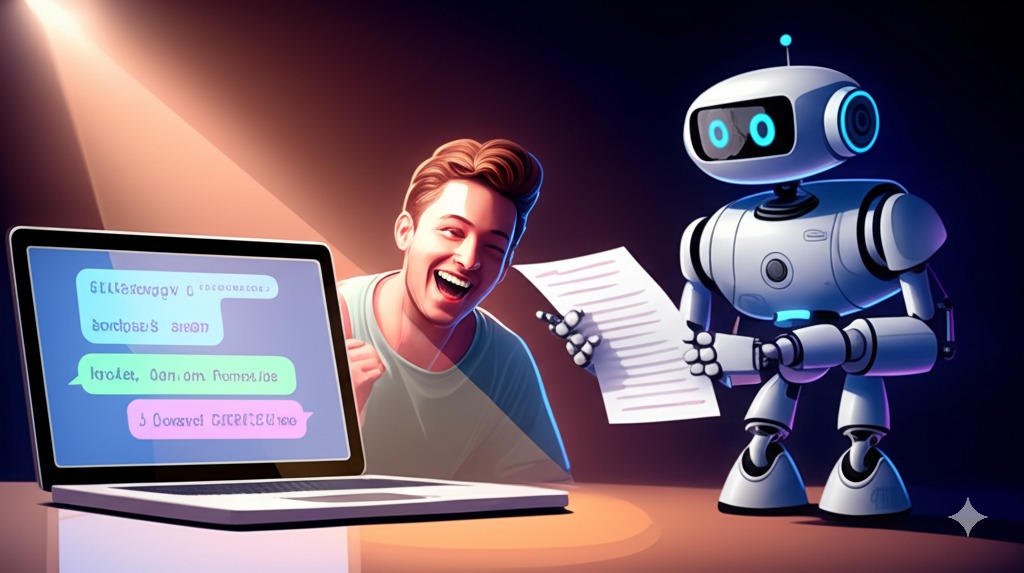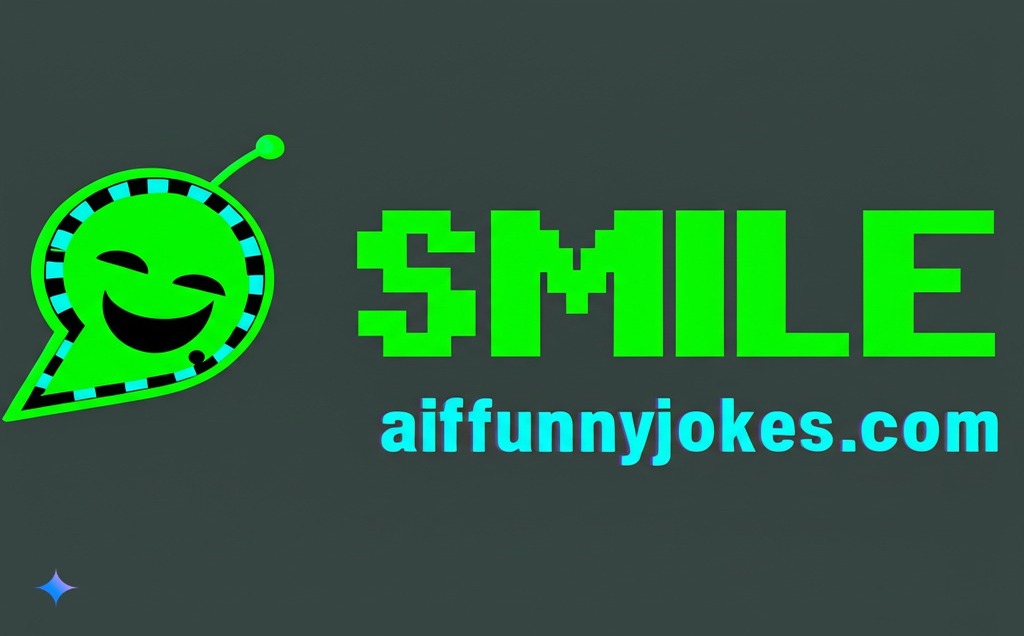
Create AI comedy script content that doesn’t sound like it was written by your refrigerator trying to be funny. That’s the dream, right? The good news: it’s actually doable now. The better news: I’ll show you exactly how to blend artificial intelligence with your human wit to create comedy that people genuinely want to consume instead of politely smiling at while looking for the exit.
Introduction – Why Use AI to Write Comedy?
AI for comedy writing is like having a writing partner who never gets tired, never needs bathroom breaks, and never steals your snacks from the fridge. But also sometimes suggests punchlines about toasters having feelings. It’s a trade-off.
Writers across entertainment are quietly embracing these tools. Late-night TV writers use AI to generate 50 joke premises in seconds. Stand-ups test alternate punchlines before hitting the stage. TikTok creators pump out daily sketches with AI assistance. The comedy landscape is changing faster than network executives can say “we need something like that Succession show but funnier and cheaper.”
Want to see what AI humor looks like without human intervention? Check out these short funny jokes about AI for a glimpse into the machine mind.

Create AI Comedy Script – What You Need to Get Started
To create AI comedy script material that doesn’t make your audience cringe, you’ll need the right tools. Not all AI systems are created equal when it comes to humor—some are naturally funnier than others, just like your friends.
| Tool | Comedy Strength | Best For |
|---|---|---|
| ChatGPT | Versatile formats, quick iterations | General comedy, dialogue |
| Claude | Nuanced character voices, longer scripts | Sitcom-style writing, distinct personalities |
| Sudowrite | Story structure, narrative comedy | Full-length scripts with plot |
| Jasper | Marketing-focused humor | Commercial scripts, social posts |
| NovelAI | Absurdist, unpredictable humor | Surreal comedy, unexpected twists |
The best choice depends on your comedy style. Writing a workplace sitcom? Claude handles distinct character voices well. Need bizarre non-sequiturs? NovelAI delivers weirdness on demand. For most beginners, ChatGPT offers the most versatile starting point without overwhelming you with options.
For more tech humor inspiration, these Python coding jokes show how even technical subjects can be made funny.
Step-by-Step Process to Create an AI Comedy Script That Works
1. Define the Concept and Format
Before you create AI comedy script content, decide what type of comedy you’re making. Each format has different requirements:
Sitcom script: AI excels at familiar settings with clear character archetypes. Here’s an AI-generated opening for “Tech Support,” a workplace comedy:
“INT. TECH SUPPORT OFFICE – MORNING
DAVE (30s, perpetually caffeinated) stares at his screen in horror.
DAVE: Guys, the internet is down.
(The office erupts in panic like they’ve announced the apocalypse)
MELISSA (20s, competent, perpetually underestimated): Have you tried turning it off and on again?
DAVE: The internet doesn’t have an off button, Melissa.
MELISSA: I meant the router, Dave.
DAVE: Oh. That makes more sense.”
Sketch comedy: For a “Dating App for Introverts” sketch, AI suggested:
“NARRATOR: Introducing ‘Hermit’ – the dating app for people who hate dating.
(CUT TO: Person swiping on phone)
NARRATOR: Swipe left to reject. Swipe right to show interest. Swipe up to schedule a date that both of you will cancel at the last minute.”
Stand-up routine: For observational humor about modern workplaces:
“You know you’re in a tech startup when the office has a ping-pong table but no working printer. We’ve got kombucha on tap but the bathroom’s been out of soap for two weeks. Priorities, people!”
For more format ideas, browse these classic joke formats for structural inspiration.
2. Generate Raw Material Using AI
To create AI comedy script foundations, you need effective prompts. Your prompt is like directing a comedian who’s technically brilliant but has never met a human before.
Effective prompt examples:
For character-driven comedy: “Write a funny dialogue between two characters: a perfectionist chef and a chaotic food delivery driver who keeps mixing up orders. Focus on escalating miscommunication.”
For observational humor: “Generate 10 humorous observations about how parents use technology differently than their children. Make the observations specific and visual rather than generic.”
For topical comedy: “Write 5 jokes about social media addiction that don’t use obvious punchlines about ‘scrolling for hours’ or ‘checking likes’. Focus on unexpected comparisons and fresh perspectives.”
The key is specificity. “Write something funny” gets mediocre results. “Write a scene where someone tries to explain cryptocurrency to their grandmother during Thanksgiving dinner, with increasingly absurd metaphors” gives the AI enough direction to generate usable material.
3. Refine and Re-Write with a Human Touch
No matter how good the AI gets, you’ll need to humanize its output to create AI comedy script content that truly resonates. Look for these problems in AI-generated comedy:
- Overexplaining punchlines
- Too many adjectives
- Lack of subtext or timing
- Missing cultural awareness
Before (AI-generated): “I tried meditation, which is the practice of clearing your mind and focusing on breathing. It was challenging because my brain, which processes thoughts constantly, wouldn’t stop thinking about all the emails I need to send, which are numerous and important for my job in the modern workforce.”
After (Human edit): “I tried meditation. Turns out my brain is basically a pop-up ad that follows you between websites. ‘Hey! Before you find inner peace, remember those 47 unread emails! Also, did you leave the oven on? In 2019?'”
The human edit cuts the explanation, adds visual imagery, and uses timing breaks that better match how people actually speak.
Where AI Shines in Comedy Scriptwriting
AI joke writing tools excel at certain comedy elements. They’re particularly good at generating volume—creating 50 variations on a joke premise in seconds. They also make unexpected connections that human writers might miss.
This AI-generated exchange works because of its absurd escalation:
“CUSTOMER: I’d like to return this toaster.
CLERK: What seems to be the problem?
CUSTOMER: It keeps texting my ex-girlfriend.
CLERK: It’s connected to WiFi?
CUSTOMER: No, that’s what’s concerning.”
The joke works because it sets up a realistic scenario, introduces an impossible problem, then doubles down on the absurdity while maintaining internal logic. AI is good at this form of escalating absurdity because it doesn’t get self-conscious about being ridiculous.
For more examples of effective humor, see these hilarious robot jokes that showcase both human and machine perspectives.

Where Human Writers Still Dominate
Funny scripts using AI still need human intervention, especially for cultural awareness and emotional resonance. AI models don’t truly understand human experiences—they approximate them based on patterns.
This AI joke falls flat: “Why did the millennial bring a ladder to the bar? To get to the high prices!”
It fails because it relies on a generic stereotype without specific observation or lived experience. A human writer would know this joke doesn’t capture anything authentic about millennial experiences or modern bar culture.
Humans also understand pacing and build-up. AI tends to rush to punchlines or become distracted by tangents, while human writers instinctively know when to plant a joke’s seeds and when to harvest the laugh.
Create AI Comedy Script Collaboratively – Best Practices
Comedy screenwriting with AI works best as a collaborative process. Think of AI as your comedy sous chef—it preps ingredients, but you’re still the head chef deciding what makes it to the plate.
Effective AI-Human Workflow:
- Use AI for initial brainstorming (generate 10-20 premises)
- Select the 2-3 strongest concepts
- Have AI expand these into fuller scenes/bits
- Edit for voice, timing, and cultural relevance
- Test with a small audience
- Refine based on feedback
- Final human polishing for consistency
Keeping your human voice:
- Identify your unique comedy perspective before involving AI
- Add specific details from your experiences
- Read all dialogue aloud—if it feels unnatural to say, rewrite it
- Inject your speech patterns and vocabulary into AI-generated text
For more creative inspiration, check out these brain teasers that challenge conventional thinking.
Real-Life Examples: Who’s Already Using AI for Comedy?
The movement to create AI comedy script content is already underway across entertainment. The popular YouTube channel “AI and Humans” generates sketch premises with AI, then films them with human performers, regularly hitting millions of views.
TikTok creator @FutureFunnyGuy built a following of 2.7 million by taking AI comedy premises and performing them with his distinct physical comedy style. “The AI gives me concepts I’d never think of,” he explained. “Like the sketch about a GPS that gives emotional directions instead of geographic ones. That was an AI idea I just performed and edited.”
Several podcasts use AI to generate topic ideas and joke premises, including “The Neural Network” comedy podcast, which openly discusses which parts were AI-assisted.
Even traditional TV is experimenting. A writer for a major network comedy (who requested anonymity) shared: “We use AI in the room to break through blocks. When we’re stuck on a B-plot for an episode, we’ll feed the characters and situation into AI and see what it suggests. About 10% of the time, it gives us something genuinely useful that we develop.”

Final Tips – Create AI Comedy Script That Feels Fresh and Relatable
To create AI comedy script work that stands out, avoid these common pitfalls:
- Relying too heavily on AI-generated dialogue without editing
- Letting AI handle culturally sensitive humor without oversight
- Accepting the first version instead of iterating multiple times
- Ignoring audience feedback because “the AI said it was funny”
- Overusing common comedy formats that AI tends to default to
Remember: AI is excellent at generating unexpected connections and volume of ideas, but humans excel at emotional authenticity and cultural awareness. The ideal partnership uses AI as an idea multiplier and humans as quality filters and emotional architects.
As one successful comedy writer put it: “AI is like having an infinitely patient, slightly alien writing partner who occasionally says something brilliantly funny and occasionally suggests that humans enjoy jokes about database optimization.”
The perfect formula: Use AI to overcome blank page syndrome and generate raw material, then apply your human experience, cultural awareness, and sense of timing to transform it into comedy that truly connects.
Want to see more examples of effective comedy structures? Check out these top AI jokes that showcase strong joke construction principles.
Create AI comedy script content today, and you’ll join the cutting edge of entertainment’s future—a place where technology amplifies creativity rather than replacing it. Just remember to keep it human enough

